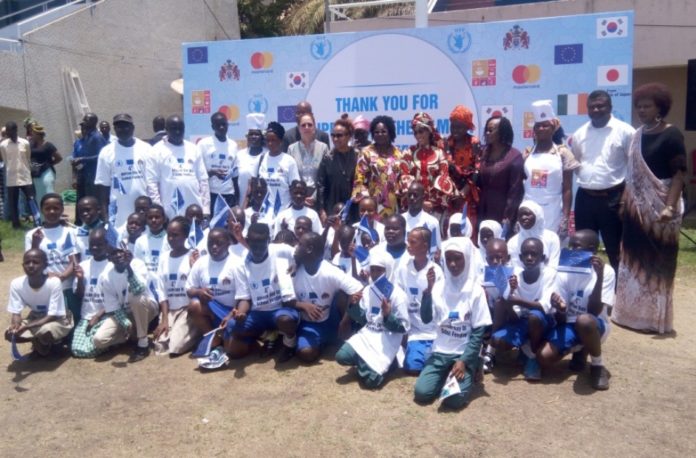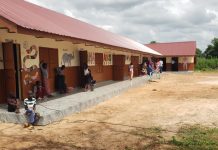By Ndey Sowe
The Minister for Basic and Secondary Education Claudiana Cole, on Tuesday April 30th, said School meals contribute to better education results in the country. The Minister made the statement during celebrations marking the 4th Africa Day of School Feeding at the McCarthy Square in Banjul. The day which is set aside by the African Union, is for Governments and stakeholders to reflect on the achievements and gaps in the implementation of sustainable home grown School feeding programs.
The theme for this year’s celebration was: “Invest in Home grown School Feeding to Achieve Sustained and Inclusive Education for all.”
Cole said the day is to share ideas in implementing home-grown School feeding programs and above all, showcase the School menu in our diversity food basket; that according to research, in 2017 the country steadily improved net School enrolment, including the completion rates and gender parity; that recently, Government’s performance assessments showed that School meals contribute to better education results and provided a safety net for populations coping with recurring food insecurity both in rural and urban areas.
‘‘In the Gambia, the School feeding program targets a total of 500,000 beneficiary students across the six Education regions. There is still an outstanding figure to match this target number since only 151, 000 beneficiary students are being fed at the moment,’’ she said.
She concludes that it is imperative to galvanize efforts to make the nationally owned home-grown School feeding program a reality, in the Gambia.
The celebration took the form of a food fair, including cooking demonstrations and a march pass by School children from beneficiary Schools. Participants of the food fair were drawn from both the public and private sectors.
Fatoumata Bah Barrow, wife of President Adama Barrow said School feeding is essential and necessary, ‘‘if we wish to achieve our educational goals as prescribed in the Government’s National Development blue print (NDP). She described the implementation of School feeding programs as a step towards achieving zero hunger; that providing a meal for School going children, will eliminate immediate hunger and keep them well-nourished; that Government is making tremendous efforts to ensure that the program becomes fully adopted and integrated in the national context. Mrs. Bah Barrow said since 2017, Government has taken over School feeding program from the WFP (World Food Program), in two regions. She said Government will work with WFP and FAO to ensure that food commodities supplied to Schools are locally procured; that School feeding program is important in order to change lives in Africa.
“We must place them at the forefront of our national priorities,” she said; that the transformative role of education and training in building human capital and the empowerment of our youth, women and marginalized groups, are absolutely paramount.
ECOWAS Representative Vabah K. Gayflor in her deliberation on the joint statement by the African Union, ECOWAS Commission, and the WFP, spoke at a length on the issues related to Africa Day of School Feeding. She assured that UN agencies will continue to provide financial support to organize the event in the future, and urge more stakeholders to join support for this day.
Other speaker include Seraphine Wakana, the UN Country representative and Sulayman Cham from NIRO Restaurant and Catering.




















